Can you really lose weight by eating fat? That’s what it looks like with coconut oil, a common, easy-to-find, and inexpensive supplement that activates your body’s ketogenic pathways and increases your metabolism. Here are the best coconut oil supplements you can get your hands on:
Research
Rankings
1. Viva Naturals Organic Extra Virgin Coconut Oil
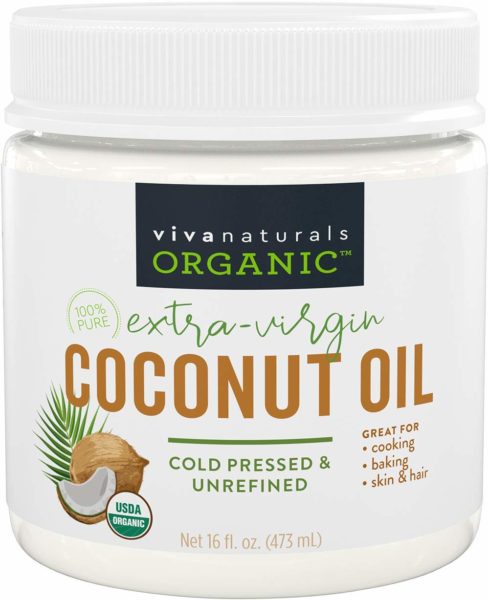
Organic, all-natural, and cold pressed…is there anything not to like about Viva Naturals?
Their coconut oil is certified organic, meaning there are no chemical contaminants to worry about, and the only ingredient is extra-virgin coconut oil. It’s a product of the Philippines, so you could try to hold that against it, but good luck growing a solid coconut crop domestically. Viva Naturals comes out on top because it checks all the boxes.
2. Kirkland Signature Organic Virgin Coconut Oil
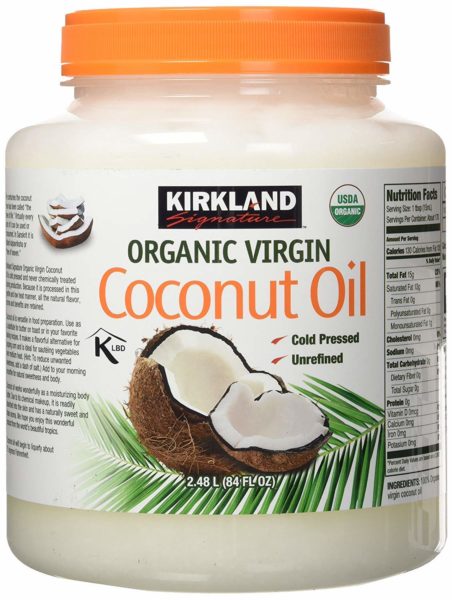
Kirkland Signature is a well-known favorite among supplement enthusiasts who appreciate bulk-packaged, pure, cheap, and effective products, and their coconut oil product fits the bill to a T.
It comes in a huge, utilitarian and simple plastic jar, and it’s certified organic, virgin, and cold pressed. When it comes to cost, Kirkland delivers as always: packaged in an 84-ounce bottle, it’ll satiate even the most aggressive coconut oil users for a long time and for a low price.
3. Island Fresh Superior Organic Virgin Coconut Oil
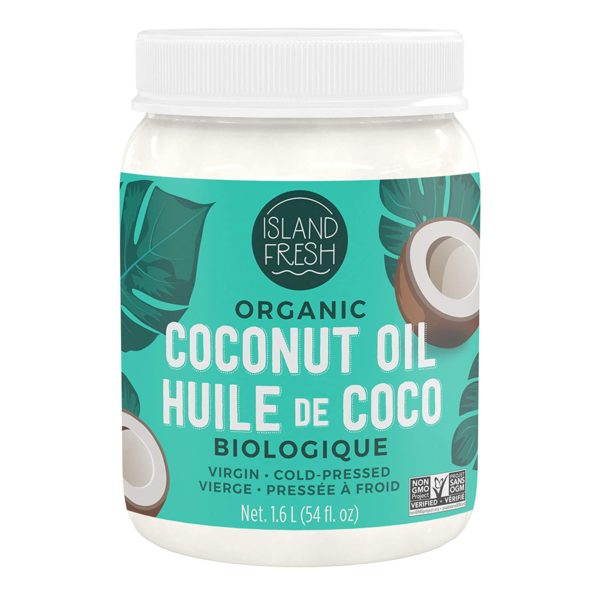
When it comes down to value and quality, Island Fresh Coconut Oil sets a high bar. Like many of the top coconut oil products, Island Fresh uses only virgin cold pressed organic coconuts when manufacturing its product.
It’s definitely packaged for form over function: the large plastic tub makes it easy to scoop or scrape out however much coconut oil you need, and is accident-proof (for the most part, at least). It’s a plain, simple, utilitarian coconut oil that will work equally well for the supplement and for the cosmetic crowd.
4. Garden of Life Organic Extra Virgin Coconut Oil
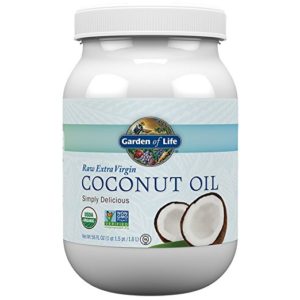
While Garden of Life makes its name with plant-derived vitamins and supplements, its coconut oil offering is in line with most of the other major brands.
Nothing adventurous here; just a low-cost plastic jar of cold pressed coconut oil. It’s certified organic, which means no pesticides or chemicals to be concerned with.
5. Majestic Pure Fractionated Coconut Oil
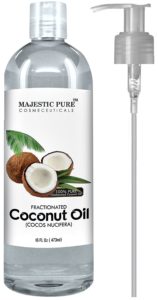
Though coconut oil is a great supplement, it’s quite useful as a cosmetic product too. It works great for keeping your hair soft, your skin smooth, and as a massage lubricant.
These are the uses that Majestic Pure is targeting with its fractionated coconut oil. It comes in a handy pump dispenser bottle, which makes dispensing the right amount a cinch.
6. Nature’s Way Organic Extra Virgin Coconut Oil
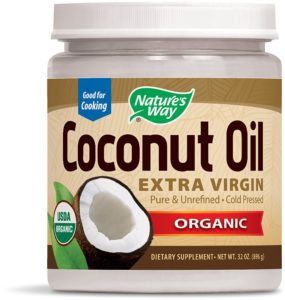
As a heavyweight in the staple supplements market, it’d be hard to imagine Nature’s Way missing out on a major product category like coconut oil. Its coconut oil is, like many of the other bulk coconut oil products on the market, cold pressed and organic.
As is often the case with this brand, it does pretty much everything right, but doesn’t distinguish itself in any particularly special way. As it’s pretty inexpensive, it’s not a bad choice, though also not the best.
7. Nutiva Coconut Oil
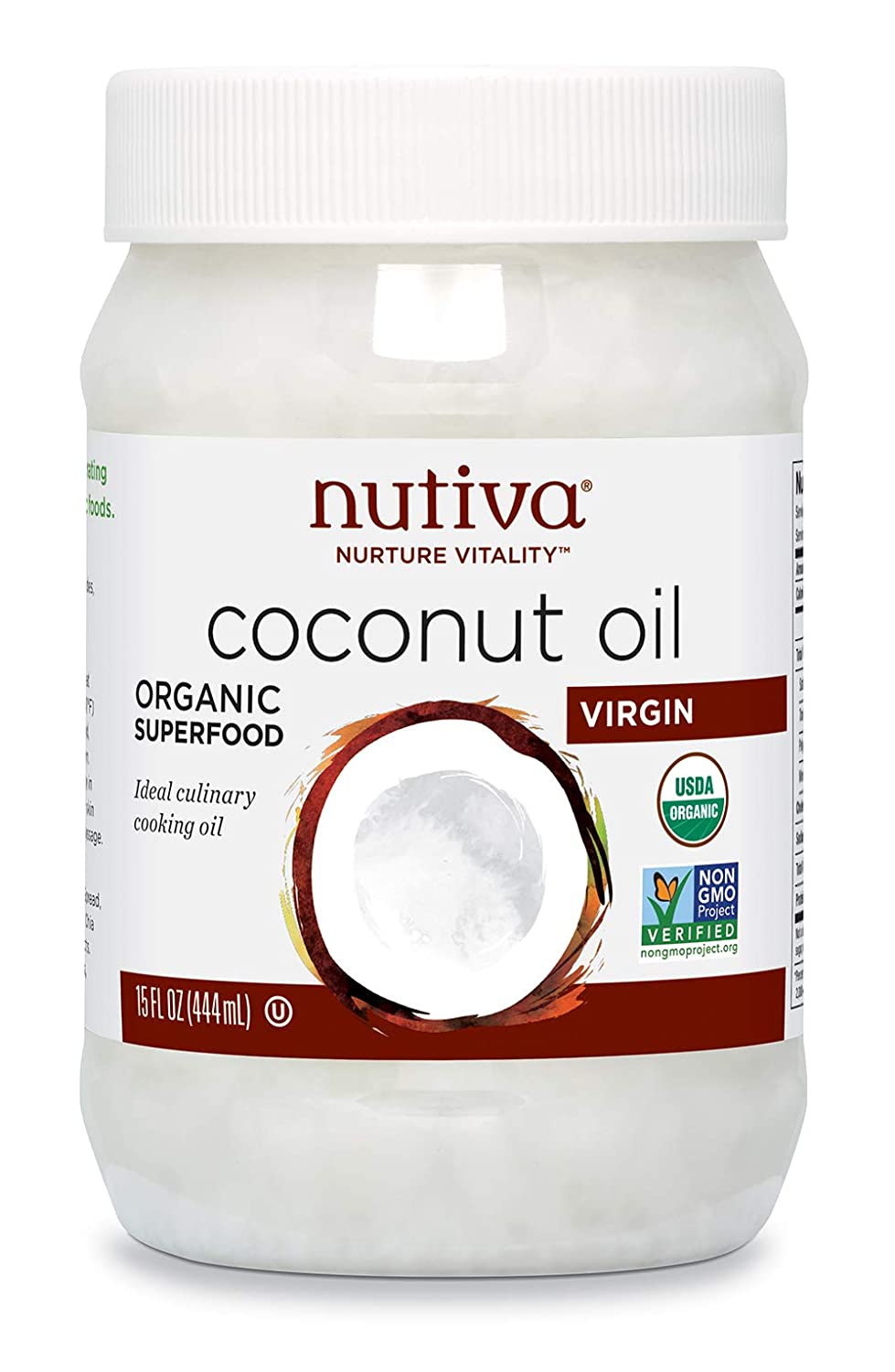
Nutiva keeps things simple and straightforward: this virgin coconut oil is organically certified and easy to use both for cosmetics and for cooking or baking. While the amount is smaller, it’s well-suited for occasional skin use or adding to coffee.
8. Coco & Co The Purest Coconut Oil
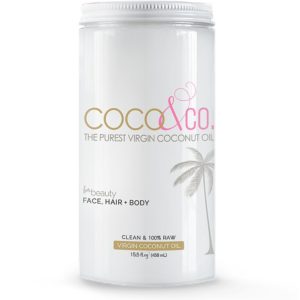
By taking one look at the jar (yes, it comes in a fancy glass jar) it’s easy to see the target market of Coco & Co’s coconut oil. This stuff is for hair, skin, and massage.
If you care at all about the appearance of your coconut oil (i.e. the bottle it comes in), Coco & Co is a great choice. It looks classy, elegant, and refined–because it is.
9. Handcraft Blends Fractionated Coconut Oil
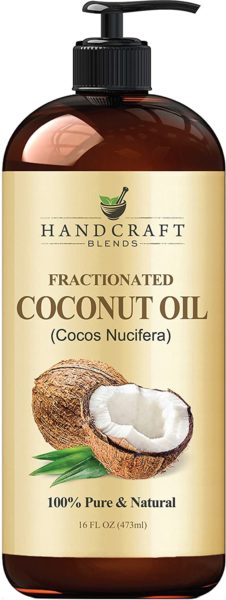
As far as coconut oils made specifically for cosmetic, topical, hair, and massage use, Handcraft Blends is a solid choice. It’s fractionated, meaning it’s been subjected to a distillation process to remove the heavier triglycerides that lower the melting point.
Beyond this, the bottle is an amber UV-resistant pump-top bottle which helps dispense the liquid coconut oil. Remember, because it’s fractionated, it will stay liquid to lower temperatures than an unprocessed coconut oil.
10. Crisco Organic Coconut Oil
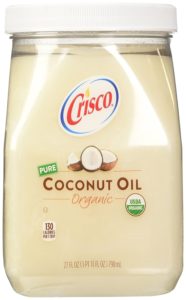
Yes, believe it or not, Crisco–purveyor of bottled trans fat for decades–has jumped on the coconut oil bandwagon and offers a line of coconut oil jars. And yes, just like the top brands, their coconut oil is cold pressed, 100% pure, and even certified organic. All in all, it’s not a bad product.
Category winners
Best coconut oil overall: Viva Naturals Organic Extra Virgin Coconut Oil
Whether it’s for cosmetics, cooking, or health, it’s hard to go wrong with Viva naturals. Sourced from organic coconut trees and cold-pressed for the best preservation of the delicate fatty acids, it provides coconut oil in as natural a form as possible.
Best coconut oil for hair: Island Fresh Superior Organic Virgin Coconut Oil
The wide-mouth jar and use of plastic (instead of glass) make Island Fresh easy to use for moisturizing your hair and scalp. The cold-pressed process only adds to its ability to nourish and strengthen your hair and cut down on scalp irritation.
Best coconut oil for skin: Island Fresh Superior Organic Virgin Coconut Oil
Island Fresh uses fair-trade sourced coconuts to make this virgin coconut oil, which comes in an easy-to-use wide-mouthed tub. These properties make it great for moisturizing your legs, face, shoulders, or anywhere else that needs the moisturizing benefits of the fatty acids in coconut oil.
Best coconut oil for keto diet: Kirkland Signature Organic Virgin Coconut Oil
Keto dieters can benefit from the bulk size and organic certification of Kirkland Signature Organic Virgin Coconut Oil. It’s the perfect option for keto-friendly cooking and baking.
Best coconut oil for coffee: Viva Naturals Organic Extra Virgin Coconut Oil
Viva Naturals is our pick for “bulletproof”-style coffee that’s fortified with the MCT oils and healthy fats in coconut oil. That’s because of its super-pure formulation and minimal processing, on top of its organic certification and modest-sized jar that prevents old oil from going bad.
Best coconut oil with MCT oils: Viva Naturals Organic Extra Virgin Coconut Oil
If you’re looking to extract the greatest benefit from the medium-chain triglycerides in coconut oil, Viva Naturals is the way to go. The cold-press processing and extra virgin style makes this coconut oil preserve the greatest quantity of MCT oils, which could get destroyed with more intensive or heat-based processes.
Who should buy coconut oil?
Coconut oil is an extremely versatile compound: you can use it for moisturizing your skin, nourishing your hair, baking, cooking, and even adding to your coffee.
Coconut oil has a mild but pleasant flavor, and is a favorite among people on low-carb or ketogenic diets thanks to its high energy content, total lack of carbohydrates, and its rich medium chain triglycerides (MCT oil) content.
In terms of its cosmetic applications, coconut oil is great for taking care of dry or cracked skin, especially if you have sensitive skin that gets aggravated by additives like fragrances and coloring agents.
It’s also great for softening and adding shine to hair: if you have dry or lifeless hair, coconut oil is a great choice. In contrast, it may not be the best choice if your hair tends to get greasy very easily (in this case, try a good dry shampoo instead).
For health, coconut oil is a far superior replacement for old-style butter alternatives like margarine. For a long time, coconut oil (and coconuts in general) were maligned because of their high saturated fat content.
However, as the science of nutrition has advanced, researchers have come to realize that not all saturated fat is equal.
The medium-chain triglycerides that coconut oil contains are not the same as the long-chain triglycerides found in other kinds of oil and fat. Many of the negative health effects traditionally associated with high saturated intake appear to be attributable only to long-chain saturated fats (1,2), which has propelled the increasing popularity of coconut oil among low carb and keto enthusiasts.
Coconut oil is a great alternative to things like safflower oil, though it’s hard to compare directly to healthy unsaturated fats like olive oil, which are known to exert positive health benefits as well. In any case, its high energy content from fat makes it well-suited for diets that require a lot of fat and not much else.
How we ranked
Coconut oil is pretty simple stuff: coconut flesh is dried, then pressed in an expeller to result in the oil. In this sense, because it is an expeller-pressed oil, it’s quite similar to olive oil and other plant-based cooking and cosmetic oils.
However, this simplicity belies the fact that coconut oil products can vary substantially in their quality. First off, there is a difference between virgin coconut oil and “RBD” or refined, bleached, and deodorized coconut oil.
This latter type of coconut oil is more heavily processed, and may not exert the same health benefits that virgin coconut oil exerts.
We eliminated RBD type coconut oil from consideration in our rankings, though we made exceptions for cosmetically oriented fractionated coconut oil products (more on this later).
We gave extra points to coconut oil products that were from coconuts grown with certified organic methods, as this was evidence that the manufacturer prioritized purity and quality of their product’s primary ingredient.
Some products brand themselves “extra virgin,” but this isn’t a precise or legally-defined term, so one brand’s “extra virgin” isn’t necessarily indicative of superiority to a different brand’s “virgin” coconut oil.
Beyond just the quality of the ingredients, we also looked at the quality of the container that the coconut oil came in. Since coconut oil can be degraded by sunlight, we rewarded products that came in UV-resistant containers as opposed to transparent containers.
One roadblock to using coconut oil for cosmetic purposes can be its melting point: at 76 degrees Fahrenheit, pure coconut oil can be solid in a cool room but liquid in a warm room. One way to get around this problem is to use fractionated coconut oil, which is somewhat more heavily processed, but has the advantage of staying liquid at a wider range of temperatures.
We included a few of the best fractionated coconut products specifically for people looking to use coconut oil as a massage oil, on their skin, or in their hair. These products ended up lower in the rankings, though, because we don’t recommend them for consumption and they are not as versatile.
Our final rankings were most heavily weighted by the quality of the coconut oil included, with organically certified virgin coconut oil products ending up highest. Other factors, like UV resistance of the packaging, were secondary factors.
Our remaining products are the best and most versatile options for coconut oil on the market right now, whether your goal is to use coconut oil for cooking, baking, skin care, hair care, or massage.
Benefits
Coconut oil could help you lose weight and burn fat. The thermogenic properties of coconut oil can help you lose weight by revving up your metabolism and targeting belly fat.
While it may seem counterintuitive to add fat to your diet when you’re working on slimming down, coconut oil isn’t just any old fat. Like butter or olive oil, it packs 9 calories a gram, which can add up fast, but some of its benefits arise from its unique molecular structure, which allows the body to process it in a different manner than other fats. (3)
A medium-chain triglyceride acid, coconut oil is shipped straight from the digestive system to the liver. From here, the body can use it for current energy demands or turn it into ketone bodies. Complex processes and changes prepare these ketone bodies for use in providing fuel for the brain, muscles and other energy needs. (4)
Ketones appear to positively affect hormones and nutrients that regulate appetite after weight-loss achieved through ketogenic diets, which remove nearly all carbohydrates from the diet. The levels of these hormones can make all the difference maintaining weight-loss. (5)
Because of their increased bio-availability factor, medium-chain triglycerides can be used to enhance the absorption of oral medications in patients being treated for conditions like steatorrhea (the inability to absorb fat), celiac disease, liver disease, diarrhea, and short bowel syndrome. (6)
The molecular structure of coconut oil activates the body’s fat-burning processes. Once this switch has been flipped, your body can utilize more stored fat as fuel instead of relying on carbohydrates for energy.
When carbohydrates are the main source of fuel, stored fat remains just that: stored.
If you eat the same amount of olive oil, which is a long-chain fatty acid, it’s more likely to increase body fat percentages. (7)
Stimulating metabolic functions is a key part of how coconut oil helps in achieving and maintaining normal weight. Metabolic disorders are on the rise, and symptoms include excess belly fat, high cholesterol levels, and elevated blood sugar levels. Put simply, the more of these symptoms are present, the more vulnerable you are to serious health problems, like stroke, heart disease, and diabetes. (8)
A small European study conducted at the University of Geneva measured participants’ energy expenditure over a 24-hour period when medium-chain fatty acids were taken three times daily at 10 grams per meal (30 grams total is about 2 tablespoons). (9)
Subjects experienced an average of 5% increase in energy expenditure, reflected a higher rate of metabolism. The end result was they burned an average of 120 more calories each day.
Eating coconut oil in the morning can also result in less hunger at lunchtime. In another small study, 14 men were isolated from clocks or any other time cues. They ate coconut oil at breakfast and were instructed to request the next meal when they felt hungry.
Those who ingested the largest quantities of medium-chain fatty acids in the morning waited longer before asking for their next meal; when they received it, they consistently consumed fewer calories than the men who ate smaller amounts of medium-chain fatty acids in the morning. (10)
A study of 40 obese women between the ages of 20 and 40 divided participants into two groups. One group supplemented an ounce of coconut oil each day and the others were given the same amount of soybean oil. The women ate a restricted-calorie diet and were asked to walk 50 minutes daily. (11)
Over four weeks, both groups lost an average of 2 pounds; the big difference in results was waist circumference. The coconut oil group lost belly fat, while the soybean oil group had larger waist measurements than when they started the program.
In another trial with 17 women over 27 days, the addition of medium-chain fatty acids to the diet significantly boosted energy expenditure. Conclusions emphasized the potential of this strategy as a long-term deterrent to weight gain, rather than as a weight-loss strategy. (12)
A group of 30 obese men added 30 grams a day of coconut oil to their diets for a month. Although no other changes were made to their diet or exercise programs, waist measurements dropped by an average of just over an inch. (13)
The effects of coconut oil as a weight loss supplement are not dramatic; using it in combination with a weight-loss diet is the best bet for making significant positive changes in overall health.
The most promising benefits of adding coconut oil to the diet are in the way it targets visceral fat stored in the abdominal area. Carrying extra pounds around the waist elevates the risk of developing a number of chronic diseases, including diabetes and cardiovascular disease. (14)
You’ll see a large variety of coconut oils on the shelf now that its healthful properties are more widely recognized. These are superior to the highly processed coconut oils used in snack foods decades ago; the hydrogenated versions of days gone by deserved the bad rap they got, so look for organic virgin coconut oil, which you can find in health food stores, many supermarkets and through various online sources.
If you find you want to include coconut oil in your diet long-term, purchasing a larger quantity will drop the price, and the oil keeps well for 18 to 24 months without refrigeration. (15)
For those who need to lose weight, simply adding coconut oil to your diet isn’t likely to stimulate significant weight-loss and could even result in weight gain if compensations aren’t made in overall dietary fat intake.
If you’re not ready to embark on a weight-loss program, start by substituting coconut oil for olive oil in recipes. Try using it for cooking and baking, or blend it with butter to shift daily fat intake from long-chain fatty acids to medium-chain fatty acids.
This is a good way to begin initiating the metabolic benefits of a healthful medium-chain fatty acid without increasing the amount of fat you eat.
FAQ
Q: Is coconut oil good for your skin?
A: Coconut oil contains a range of saturated fats that can help moisturize your skin and fight harmful bacteria on your skin that may contribute to skin problems.
One study published in the journal Dermatitis concluded that both coconut oil and olive oil can have emollient (softening) effects on skin, while also cutting down on levels of staphylococcus aureus, a harmful bacteria that’ associated with atopic dermatitis (16).
Atopic dermatitis is a recurrent skin condition that can cause dryness and itching; the study concluded that coconut oil could be helpful for treating this condition. Coconut oil has also been demonstrated to be superior to regular mineral oil (which is petroleum derived) for treating skin dryness, according to one randomized trial (17).
Perhaps the best benefit of coconut oil is that it’s totally lacking in additional ingredients: if the coloring agents, fragrances, and other compounds added to traditional moisturizers cause your skin to flare up, give coconut oil a shot.
Q: Is coconut oil good for your hair?
A: Coconut oil is great for preventing hair damage, for two reasons. First, coconut oil appears to be uniquely suited for protecting hair proteins, according to research out of India that compared coconut oil to mineral oil and sunflower oil (18).
Lab data showed that coconut oil, but not sunflower and mineral oil, could reduce protein loss from hair. The authors of the study hypothesized that the difference was the result of molecular differences in the structure of the oils.
Mineral oil, according to the authors, has no affinity for hair proteins, while coconut oil does. Sunflower oil does too, but its molecular structure is too bulky, so it can’t penetrate well into hair shafts.
The second reason why coconut oil appears to be good for your hair has to do with coconut oil’s ability to treat the base of your hair follicles.
Research published by the Society for Cosmetic Chemists found that coconut oil can fight swelling at the base of your hair roots, which in turn helps prevent hairs from being pulled or lifted out when you comb your hair (19).
Coconut oil works best for hair that is chronically dry or damaged, and the results of the research discussed above indicate that coconut oil will work best if you massage it into your scalp as well as the body of your hair.
Q: Is coconut oil bad for you?
A: Coconut oil and coconut products in general had a bad rap for a long time as a result of their high content of saturated fat.
Much of the early research on dietary macronutrient content pointed the finger at dietary saturated fat intake as the culprit for major health threats like cardiovascular disease, and even more recently, a Harvard professor made headlines by calling coconut oil “pure poison” in a widely-shared lecture (20).
The truth is more murky, however. Saturated fats aren’t all the same: when nutritionists try to fractionate out the health problems that are associated with high saturated fat intake, many of them seem to be attributable only to long-chain triglycerides, not the medium chain triglycerides that are found in coconut oil.
Moreover, feeding people medium chain triglycerides doesn’t seem to produce negative health effects, even when compared to a healthy oil like olive oil (21).
Even so, it’s still worth emphasizing that the caloric content of coconut oil is quite high: it is pure fat, after all. So if you consume a lot of it, your caloric intake is bound to be high—though this is true even of the healthiest sources of fats.
Q: Why is using coconut oil controversial?
A: The popularity and subsequent controversy surrounding coconut oil is best understood as a manifestation of a long-simmering controversy in nutrition, referred to as the “lipid hypothesis.”
The central point of contention is this: is dietary saturated fat an important determining factor for your risk of heart disease?
Early research, which focused on dietary macronutrient content, determined that it was: people who had diets that were high in saturated fat got heart disease at a much higher rate than people who had low saturated fat intake.
However, later research challenged this, when researchers started looking at the potential effects of substituting saturated fat for other macronutrients, and trying to identify which specific fat molecules (as saturated fats is a category that constitutes many different individual molecules) were responsible for the increase in risk.
According to a 2016 review article that surveyed the current state of the science, the situation is much more complex: not all saturated fats are the same (22).
In the case of coconut oil, it’s clear that it should not be considered the same as many of the other sources of saturated fat in your diet.
Q: What is fractionated coconut oil?
A: Fractionated coconut oil is coconut oil that’s been subject to a process called fractional distillation: the coconut oil is heated up in a tall column, and the lighter portion is siphoned off.
This lighter portion has a higher melting point, so will stay liquid even in cooler temperatures. That makes it great for packaging into a pump bottle for use as a massage oil, skin lotion, or hair salve.
The only downside is that it increases the amount of processing, so you may not get the full nutritional advantages of pure virgin coconut oil.
Q: How long does coconut oil last?
A: Virgin coconut will last on the shelf for about a year and a half. It’s a good idea to label a jar of coconut oil when you open it, so you don’t leave it for too long. However, coconut oil will degrade more rapidly if it is exposed to sunlight and/or heat.
That’s why we rated coconut oil products in opaque containers slightly higher in our rankings, all else equal: these coconut oils are better protected from ultraviolet light. Regardless of the packaging, the best place to keep coconut oil is somewhere that’s relatively cool and dark.
Keep in mind the melting point of coconut oil, though: at about 76 degrees, coconut oil will change from being solid to being liquid. Depending on how you hope to use coconut oil, you may want to store it somewhere slightly warmer or cooler.
Q: What is virgin coconut oil?
A: Virgin coconut oil is an unprocessed form of coconut oil that consists of coconut material that is dried and pressed. The term “virgin” contrasts it from RBD coconut oil, which stands for refined, bleached, and deodorized.
Commercially, coconut oil usually undergoes this three-step process to increase its shelf life and homogenize it. Because the RBD process changes the chemical composition of coconut oil, we strongly recommend opting for virgin or extra virgin coconut oil instead.
Q: How do you melt coconut oil?
A: Coconut oil readily melts around room temperature. Its melting point is right about 76 degrees, so depending on what your thermostat is set at, your coconut oil might be already melted if your room is warm.
If your coconut oil is solid, though, there are a few good ways to melt it. If all you need is a little bit to put in your hair or on your skin, you can put a dab of it on your palms and rub them together.
The friction will create heat and melt the coconut oil. You can also melt it by partially submerging your jar of coconut oil in a tub of warm or hot water. We don’t recommend using a microwave, unless you only microwave it for 10-20 seconds at a time, stirring in between.
Microwaving coconut oil for too long can create localized hot spots, which can degrade the coconut oil or create trouble when you try to apply it to your skin. A hot water bath applies much more even and mild heat.
Q: What kind of fat is coconut oil?
A: Coconut oil is almost entirely saturated fat, but even that is a pretty broad category. It’s more accurate to say that coconut oil consists of high levels of medium chain triglycerides, to a much greater degree than similar sources of saturated fat. These MCT oils may account for the unique benefits of coconut oil.
Related articles
Recap
When you’ve chosen the diet plan you believe will work best for you to achieve your weight loss goal, coconut oil may be an excellent way to support your efforts and help keep weight off long-term through appetite suppression and increased energy expenditure.
For BodyNutrition‘s #1 coconut oil recommendation, click here.